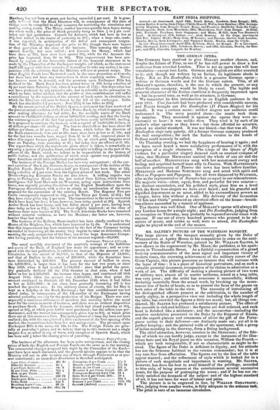THE GERMAN OPERA.
THE Germans have resolved to give MOZART another chance, and, despite the failure of Titus, to see if he has still power to draw a few audiences from crowded London. Titus is not an opera that will bear translation—except into Latin. German and English are alike unsuited to it ; and, though not written by an Italian, its legitimate abode is Italy. Not so Die Zauberflote, which is a genuine German opera— written to German words and for the German nation. This, of all MOZART'S operas, therefore, is the one in which the present, or any other German company, would be likely to excel. The legible and graceful character of the Italian cantilena is frequently impressed upon it ; but its general tone, as well as its structure, is German. We remember its first introduction to an English audience in the year 1811. Cosi fan tutti had been produced with considerable success, and Namur brought out Die Zauberflote (II Flauto Magico) for his benefit. It was a curious scene : neither singers nor audience could understand it. The story puzzled them—the music took them by surprise. They measured it against the operas they were ac- customed to hear : it was unlike them. They tried it by such of its author's other operas as they knew : but these afforded no accurate, indeed no similar standard. It was not hissed—but that was all. Die Zauberilote slept very quietly, till a former German company produced the real composition ; for such the Italian version in the hands of Italians could scarcely be called. On Thursday evening, we had the happiness of hearing it again ; and we have never heard a more satisfactory performance of it, with the exception of a single character. The sangs of the Queen of' Night (written for a particular singer) demand such an unusual compass of voice, that Madame MICHALESI omitted the whole of one air and the half of another. HEINEFETTER sang with her accustomed energy and feeling, and acquitted herself most ably in Pamina. With Harrznanan's excellent performance of Tamino the town has been before familiar. MELLINGER and Madame SCHUMANN sang and acted with spirit and effect as Papageno and Papagena. But all were distanced by STAUDIGL, who as the representative of Sarastro has no equal in our remembrance. His majestic voice—clear, equal, firm, and powerful for two octaves— his distinct enunciation, and his polished style place him on a level with the finest bass-singers we have ever heard; and his graceful and dignified deportment as an actor, added to his extraordinary powers as a singer, leave him without a rival. His delivery of the invocation "0 Isis und Osiris" produced an electrical effect on the house—breath- less silence succeeded by a tumult of applause. Tne theatre was well filled. One of MOZART'S operas will always fill any London house for a single night ; and Die Zauberflote, judging from its reception on Thursday, may probably be repeated several times with success. If one out of every hundred persons who pretend to be ad- mirers of music, and critics as well, were to attend, Die Zauberjlote might be played to the end of the season.


























 Previous page
Previous page